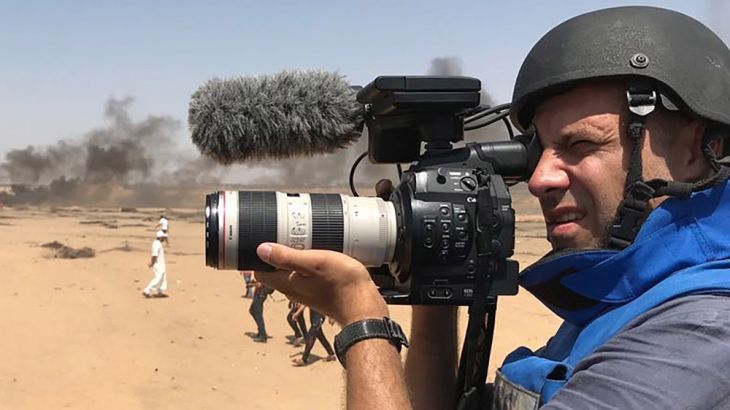Gaza through the eyes of a poet
An unconventional protest leader is inspiring the people of Gaza to pursue non-violent resistance against Israel.

It shouldn’t be a surprise that Gaza is fertile ground for a poet.
The Israeli occupation seems surreal here. At times it can be hard to see it; unlike other parts of Palestine, there are no young Israeli soldiers patrolling the streets in olive uniforms and armoured vehicles. The tools of oppression are largely hidden from sight.
Maybe that’s why so many Gaza Palestinians seem to gaze into the distance.
There is a constant buzz of Israeli drones – many of them armed – overhead. But when you look up, all you see is a clear blue sky.
Walking along the beach I’d see people staring out to sea. The Israeli ships that help impose the blockade are out of view so all that can be seen is the beautiful Mediterranean horizon.
I was even struck to find this trait of “looking out” at the protests organised by poet Ahmed Abu Artema, the man we followed in our film, Gaza: Between Fire and Sea. Although some young men run up to the perimeter fence, most of the crowd just stand and stare out across the barbed wire, through the smoke of burning tyres to a land once theirs. It is as though they are staring into history, staring into their dreams.
The reality of collective punishment is brutal on body and soul.
Making this film was my first trip to this sliver of land squeezed between a hostile Israel, an increasingly inhospitable Egypt and the Mediterranean Sea.
There is a constant buzz of Israeli drones - many of them armed - overhead. But when you look up, all you see is a clear blue sky.
The phrase “open prison” is often used to describe Gaza, but the reality of this concept only truly hit home once I arrived at Erez. The Erez – or Beit Hanoun – Crossing is the only entry point into the Strip from Israel. It looks like a cross between an airport and a maximum security facility. The lack of people, other than Israeli border guards, creates an eerie atmosphere. But one thing became clear – I was entering a prison.
When I met Ahmed I was struck by the seeming contradiction: a protest leader who loves little more than to spend time in a library. This quiet, patient man defied the stereotype of shouting Gazans we see on most news channels.
![Filmmaker Karim Shah with Ahmed Abu Artema, the Gaza Palestinian poet and one of the lead organisers of the Great March of Return [Al Jazeera]](/wp-content/uploads/2018/10/d5f60091209342dbad1d621a868a0739_18.jpeg)
He was the first of many contradictions that would confront me during my month in Gaza: A prison with a beautiful beach that smells of sewage, a place where the traffic is noisy and horns beep impatiently, but the people are warm and kind, where you’ll often spot masked men wearing green headbands and armed with Kalashnikovs, but where children are the main force on the streets.
“What’s your name?’ the children would ask me. “Karim,” I’d answer. They’d stop to take in my reply. “Hmm … what’s your name?” they’d ask again, refusing to let their limited English prevent them from continuing the conversation.
There is no ambiguity about what Israel’s more than decade-long blockade of the Gaza Strip is doing. It’s killing people. After a day of visiting young men injured during the protests, most shot in the leg, their lives and those of their families devastated, my last visit was to the Shifa hospital.
I wasn’t allowed to film there but spent some time in front of the emergency wing. A group of young men were sitting on the curb, a few of them crying. I asked what had happened. Their friend had been shot dead, they said. I was confused because I knew there had been no protests that day. Perhaps he was a farmer who’d got too close to the fence? I soon found out that their young friend had shot himself in the head. Later that night my colleague confided that such acts of despair were becoming more common. Maybe that’s why some young men run up to the fence, towards the Israeli snipers, nestled in their bunkers, fingers on triggers, ready to kill with impunity?
![Since Gaza's non-violent protests began, in March 2018, nearly 200 people have been killed and 18,000 injured, many of them seriously [Screengrab/Al Jazeera]](/wp-content/uploads/2018/09/3ef59971ff8b49a9a5ca3f8eb20667e6_18.jpeg)
I’m used to such stories. It’s my job to help them be heard. But the most heartbreaking encounter for me was while filming some general shots on a hill in Gaza City. I focused on three teenage boys sitting together, looking out over their city. They eventually came and talked to me. They were all 14 years old; healthy and good looking, cheeky and smart. I asked them if they thought they’d ever be able to leave the Gaza Strip, even just to visit the West Bank. They laughed at me and the naivety of my question: “Of course not.”
This is why what Ahmed is doing is important. People need poetry and the peaceful protest it inspires. If they are ever going to be free, they have to let their souls and imaginations soar first. Or at least I have to believe that. It may have been going on for 70 years, but we can’t allow this oppression to become a given.